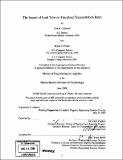The impact of lead time on truckload transportation rates
Author(s)
Caldwell, Erik R. (Erik Russell); Fisher, Bryan C
DownloadFull printable version (29.96Mb)
Other Contributors
Massachusetts Institute of Technology. Engineering Systems Division.
Advisor
Chris Caplice.
Terms of use
Metadata
Show full item recordAbstract
The objective of this thesis was to analyze truckload shipment transactions in order to determine if rates are impacted by tender lead time, which is the amount of time between when a carrier is offered a load to when the load needs to be picked up. The research specifically focused on how tender rejections by carriers are the ultimate driver of transportation cost variances since most rates are contractually fixed in advance. The data revealed a strong correlation between tender rejections and increased costs. Many factors affect transportation costs. The transportation model in the paper included three key baseline factors: distance, origin, and destination of the load. The model also included tender and pick up day of week activity, economies of scale, carrier size, and tender lead time to quantify how the factors influence the cost of a load. The research suggests that even though the baseline factors dominate the cost of most loads, shippers can create savings by modifying business policy with regard to tender lead time and other factors included in the model.
Description
Thesis (M. Eng. in Logistics)--Massachusetts Institute of Technology, Engineering Systems Division, 2008. Includes bibliographical references (leaves 80-81).
Date issued
2008Department
Massachusetts Institute of Technology. Engineering Systems DivisionPublisher
Massachusetts Institute of Technology
Keywords
Engineering Systems Division.